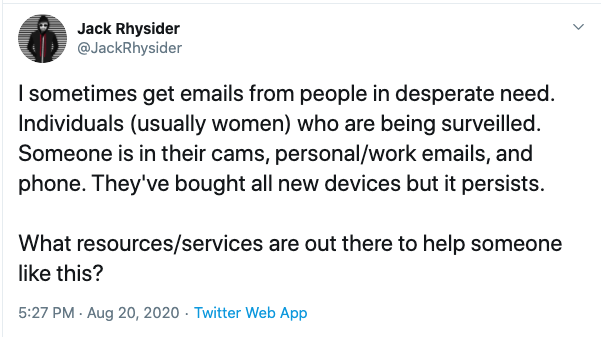A Word of Caution: Helping Out People Being Stalked Online

Jack Rhysider, of "Darknet Diaries", yesterday posted this tweet asking for ideas on how to help people who are being stalked/surveilled online. This is an issue that has come up a few times as people have reached out to us for help in the past. I would like to share a few hard-learned lessons. And please chime in with anything you have to share.
First, I think it is important to distinguish if the person reaching out is a stranger or a friend/family. In our case, it is usually a stranger. Someone who has never contacted us before. And it is very important to understand the limitations of the help you can provide.
With a stranger, you are never quite sure as to what happened in the past. The victim was often subject to prolonged abuse, and why it is easy to write them off as "crazies", it is important to understand that their perception of events can be altered. Prolonged abuse leaves marks. If a person who threatened them with harm in the past, and has in the past followed up on these threats, then they will believe that this person will also follow up on threats like "hacking them" or "surveilling them in their video cameras", even if they don't. These threats can be very debilitating to the victims. But for an outsider, it is usually impossible to convince the victim that these threats are empty. You, as an outsider, have no history with the victim while the aggressor has. Also, these victims may have been taken advantage of in the past by others who claimed to help, but either worked with the abuse or only were out for a quick buck.
And remember: One of the impossible tasks in information security is to prove that a system is not compromised.
So some of the basic lessons:
1. Figure out if law enforcement needs to be involved.
In particular, if a person is currently being threatened: Understand the limitations of what you can do. It can be difficult for a victim at times to reach out to law enforcement, and law enforcement is also not always equipped to properly deal with these issues. But insist that the victim will at least try to do so. In particular, if the victim is threatened with physical harm. If for whatever reason, law enforcement isn't an option or doesn't assist: Try to connect the victim to a local advocacy group that can provide help beyond the technical issues, and connects them to someone with experience in these cases.
2. Avoid contact in person
You probably will have the best intention. But do not visit a person you do not know at their home. In particular not alone. Just to make the point: Many years ago we had an ISC handler attempt to do so (the victim was living close by). Luckily the handler backed out last minute. The "victim" was later arrested trying to kill someone else they suggested of being involved in the plot against them (a radio host who as far as I could tell was accused by the shooter of operating mind control rays).
3. Be careful as to what technical self-help you offer
Many responses to Jack's tweet suggested books and websites that will educate about various techniques to secure your computing equipment and how to detect tools like keyloggers and network sniffers. Many of these sites offer great content. But be aware that not everybody knows what a cookie or an IP address is. Confirmation bias is a dangerous tool in the hands of an abuser who already convinced the victim that they are helpless. You may unintentionally make things worse by trying to help.
So what should you do? If this is a good friend or relative: By all means, go over, take a look at their system, try to find malware. If you do find malware: Explain to the victim what is going on. Try to find out (and this isn't easy!) if this was malware placed by a stalker or if this was "run of the mill" malware the victim inadvertently installed. If you don't find anything: Explain some safe computing tips. But please understand your limitations. Refer the victim to a local abuse hotline or group specializing in not just the technical side (e.g. Operation Safe Escape or other groups with a local presence in your area)
Here some links to organizations people recommended:
- Operation Safe Escape: https://safeescape.org/
- Coalition Against Stalkerware http://stopstalkerware.org/
- Battling Against Demeaning and Abusive Selfie Sharing https://badassarmy.org/
---
Johannes B. Ullrich, Ph.D. , Dean of Research, SANS Technology Institute
Twitter|
| Application Security: Securing Web Apps, APIs, and Microservices | Las Vegas | Sep 22nd - Sep 27th 2025 |


Comments